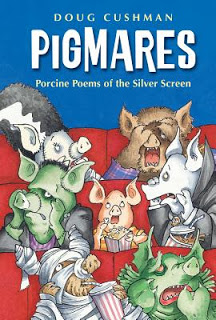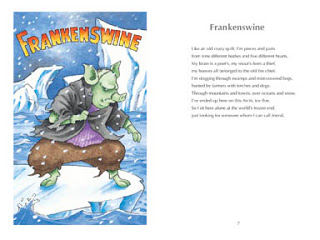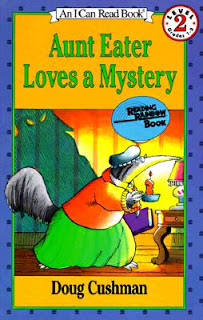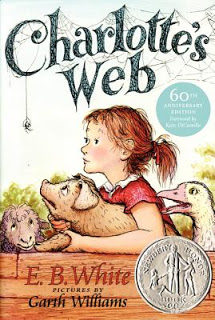I’m thrilled to be
interviewing Hen
& Ink coop mate, Doug Cushman about his newest book Pigmares: Porcine Poems of the Silver Screen (Charlesbridge, 2012). When I signed with the agency in the Spring, I thought “WOW” for obviously a
number of reasons, but having heard many of Doug’s early reader series
read-aloud by my children – I was a huge fan and excited to know we were within
the same barnyard, so to speak.
interviewing Hen
& Ink coop mate, Doug Cushman about his newest book Pigmares: Porcine Poems of the Silver Screen (Charlesbridge, 2012). When I signed with the agency in the Spring, I thought “WOW” for obviously a
number of reasons, but having heard many of Doug’s early reader series
read-aloud by my children – I was a huge fan and excited to know we were within
the same barnyard, so to speak.
Plus, my husband and I honeymooned in Paris and toured the French
countryside so anybody who lives in France has a special place in my heart. Not
to mention, anyone who can draw silly pigs and make me laugh is a friend of
mine. Mais, oui?
countryside so anybody who lives in France has a special place in my heart. Not
to mention, anyone who can draw silly pigs and make me laugh is a friend of
mine. Mais, oui?
From the Jacket Flap
copy of Pigmares: Porcine Poems of theSilver Screen:
copy of Pigmares: Porcine Poems of theSilver Screen:
Whether it’s the lonely outcast Frankenswine, the crabby
Porker form the Black Lagoon, or the sleep-loving Pigzilla, the creatures in
this clever mash-up of poetry, monsters, and piggy puns are sure to curl your
tail and tickle your hooves.
Porker form the Black Lagoon, or the sleep-loving Pigzilla, the creatures in
this clever mash-up of poetry, monsters, and piggy puns are sure to curl your
tail and tickle your hooves.
Author and illustrator Doug Chushman hams it up in this
hog-wild homage to classic monster movies.
hog-wild homage to classic monster movies.
Bienvenue, Doug!
Tell us a little about
yourself and how you came to be a children’s author and illustrator? What were
you like as a young child? How did your childhood influence the books you write
and illustrate today?
yourself and how you came to be a children’s author and illustrator? What were
you like as a young child? How did your childhood influence the books you write
and illustrate today?
I was born in Springfield, Ohio and moved to Connecticut with my family
when I was 14 years old. From Day One (almost), I was drawing and writing
stories, copying cartoon characters from the newspaper and inventing my own
characters. While in junior high and high school, I created comic books
lampooning my teachers, selling them to my classmates for a nickel a piece. So
I had a commercial bent of mind from the start.
when I was 14 years old. From Day One (almost), I was drawing and writing
stories, copying cartoon characters from the newspaper and inventing my own
characters. While in junior high and high school, I created comic books
lampooning my teachers, selling them to my classmates for a nickel a piece. So
I had a commercial bent of mind from the start.
I watched some of the old westerns on TV like the Lone Ranger and Wild
Bill Hitchcock and of course classic cartoon shows like Rocky and Bullwinkle. I
read lots of books throughout my childhood, the usual stuff mostly like the
Hardy Boys, The Three Investigators, Sherlock Holmes and some sci-fi. And of
course comic books. All of it added to my backlog of references for my own
books.
Bill Hitchcock and of course classic cartoon shows like Rocky and Bullwinkle. I
read lots of books throughout my childhood, the usual stuff mostly like the
Hardy Boys, The Three Investigators, Sherlock Holmes and some sci-fi. And of
course comic books. All of it added to my backlog of references for my own
books.
What was the
inspiration behind Pigmares: PorcinePoems of the Silver Screen (Charlesbridge, 2012)?
inspiration behind Pigmares: PorcinePoems of the Silver Screen (Charlesbridge, 2012)?
I love old cheap B movies, the corny
monster movies. Some of them actually are very well made and have heart to
them. Look at Boris Karloff’s portrayal of the Creature in Frankenstein, he almost makes one cry. And of course I love drawing pigs.
Such intelligence and grace. And silly. What could be better, writing and
drawing pigs as classic monsters? A match made in heaven, in my opinion.
monster movies. Some of them actually are very well made and have heart to
them. Look at Boris Karloff’s portrayal of the Creature in Frankenstein, he almost makes one cry. And of course I love drawing pigs.
Such intelligence and grace. And silly. What could be better, writing and
drawing pigs as classic monsters? A match made in heaven, in my opinion.
What came first the
pictures or the poems? The characters or the plot?
pictures or the poems? The characters or the plot?
There really isn’t a “plot” per se
in Pigmares, more of a theme, classic
movie monsters parodied in poetry using pigs. I never liked poetry much. One of
my high school teachers shoved Rod McKuen down our throats. Awful stuff. I
hated him. Never read poetry afterwards. It wasn’t until I began writing my own
picture books that I discovered poetry was the perfect vehicle for a picture
book text.
in Pigmares, more of a theme, classic
movie monsters parodied in poetry using pigs. I never liked poetry much. One of
my high school teachers shoved Rod McKuen down our throats. Awful stuff. I
hated him. Never read poetry afterwards. It wasn’t until I began writing my own
picture books that I discovered poetry was the perfect vehicle for a picture
book text.
In a picture book text each
sentence, word, each comma and period is important just as in poetry. The
rhythm is paramount in both as well. But even then I hesitated because it was
so hard to do. Most of what I read was rubbish and maudlin in picture books.
Cute and cheap. Even today most of what I read isn’t worth the paper it’s
printed upon (or the digital space it takes up in an ebook). I was after something that could work on a
number of levels, funny, some clever rhymes and a surprise twist and, with luck
and a lot of work, some intelligence.
sentence, word, each comma and period is important just as in poetry. The
rhythm is paramount in both as well. But even then I hesitated because it was
so hard to do. Most of what I read was rubbish and maudlin in picture books.
Cute and cheap. Even today most of what I read isn’t worth the paper it’s
printed upon (or the digital space it takes up in an ebook). I was after something that could work on a
number of levels, funny, some clever rhymes and a surprise twist and, with luck
and a lot of work, some intelligence.
It’s important to note that this is my first, full blown, no holds barred
collection of poems, written and illustrated by myself. Even though Pigmares is a humorous poetry book
poking fun at classic movie monsters this was one of the most heavily
researched book I’ve ever done. I watched and re-watched every movie in the
book and researched each one for the Poem Source pages at the end of the book
making it a good introduction to the history of each movie. In one case, for
instance, I timed the actual screen appearance of the monster. Even the hand
lettering on each poster was researched to give a historical sense of the
movie, in most cases using the original posters as the main source.
collection of poems, written and illustrated by myself. Even though Pigmares is a humorous poetry book
poking fun at classic movie monsters this was one of the most heavily
researched book I’ve ever done. I watched and re-watched every movie in the
book and researched each one for the Poem Source pages at the end of the book
making it a good introduction to the history of each movie. In one case, for
instance, I timed the actual screen appearance of the monster. Even the hand
lettering on each poster was researched to give a historical sense of the
movie, in most cases using the original posters as the main source.
The book took about a year to do although many of the poems were written
years before. But, as the book evolved and the format of movie parody and
information came together, old poems were rejected and new poems were written.
Which is harder,
writing or drawing? And why?
writing or drawing? And why?
Writing by far. The first draft of
anything is always the hardest. I’ve always said that there are no such
creatures as “writers”; we are all “re-writers”. I love playing with words, moving them
around, creating an image with just words. But when I can’t, my pictures come
to the rescue. In a picture book the words only do part of the job, the pictures
only part of the job. But when they work together it’s brilliant. But the
reader has to do some of the work too. That is what makes it a satisfying
experience.
anything is always the hardest. I’ve always said that there are no such
creatures as “writers”; we are all “re-writers”. I love playing with words, moving them
around, creating an image with just words. But when I can’t, my pictures come
to the rescue. In a picture book the words only do part of the job, the pictures
only part of the job. But when they work together it’s brilliant. But the
reader has to do some of the work too. That is what makes it a satisfying
experience.
Can you share one
aspect of your writing or illustrating process?
aspect of your writing or illustrating process?
The most fun I have is making a
dummy for a picture book. I literally cut and paste (yes, with REAL scissors
and tape) and make a collage–book of picture and words, physically moving them
around throughout the dummy. The studio is a mess (well, it’s mostly a mess
anyway….). But it makes for a VERY active and living process.
dummy for a picture book. I literally cut and paste (yes, with REAL scissors
and tape) and make a collage–book of picture and words, physically moving them
around throughout the dummy. The studio is a mess (well, it’s mostly a mess
anyway….). But it makes for a VERY active and living process.
Where do you find your
story ideas?
story ideas?
Everywhere. My problem isn’t so much
finding story ideas as trying to settle on one I want to work on at that moment
and KEEP working on. You have to love your idea for at least 3 years or so
(preferably longer) because, if that book is accepted, you’ll be living with it
on an almost daily basis for at least 3 years.
finding story ideas as trying to settle on one I want to work on at that moment
and KEEP working on. You have to love your idea for at least 3 years or so
(preferably longer) because, if that book is accepted, you’ll be living with it
on an almost daily basis for at least 3 years.
What’s the best
experience you’ve had in publishing? What’s the worst?
experience you’ve had in publishing? What’s the worst?
I’ve been through pretty much all
the experiences, cancelled contracts, rejections, bad printing, etc. I choose
not to focus too much on the negative ‘cause I love my job so much. Just
knowing I can get up every morning and draw some pictures and write some
stories is wonderful. Cliché and maudlin, I know, but it’s the truth.
the experiences, cancelled contracts, rejections, bad printing, etc. I choose
not to focus too much on the negative ‘cause I love my job so much. Just
knowing I can get up every morning and draw some pictures and write some
stories is wonderful. Cliché and maudlin, I know, but it’s the truth.
With over 120 published
books, do you have a favorite or a favorite character? And why?
books, do you have a favorite or a favorite character? And why?
That’s like asking a mother who her
favorite child is. And I ain’t going there! 😉
favorite child is. And I ain’t going there! 😉
Whose books do you
admire? And why?
admire? And why?
E.B. White was a brilliant writer
and not just Charlotte’s Web. His
prose is simple and clear and seemingly effortless…and hard to achieve. James
Thurber is a favorite as well as Dorthy Parker. I read a lot of S.J. Perelman,
another humorist from the ‘30s and ‘40s. Then Wilkie Collins, a contemporary of
Charles Dickens is a favorite.
and not just Charlotte’s Web. His
prose is simple and clear and seemingly effortless…and hard to achieve. James
Thurber is a favorite as well as Dorthy Parker. I read a lot of S.J. Perelman,
another humorist from the ‘30s and ‘40s. Then Wilkie Collins, a contemporary of
Charles Dickens is a favorite.
Can you speak about
your successes and challenges in this competitive children’s book market?
your successes and challenges in this competitive children’s book market?
For myself, I’ve followed pretty
much my own heart, or “gut” while trying to stay flexible in this always
changing market. I don’t follow trends or the “genre du jour”. I can only write and draw what feels right,
trying to stay true to myself. It doesn’t always work but trying to work JUST
for the marketing trends is a waste of one’s time and talent. I’ve gained a
bunch of awards along the way but they really don’t mean much; you’re only as
good as your last book especially in this market. The challenge is to move on
and hone my craft. I still have to get up each day and try to do better. My
biggest challenge is to find something new and interesting that will excite me,
perhaps even reinvent myself.
much my own heart, or “gut” while trying to stay flexible in this always
changing market. I don’t follow trends or the “genre du jour”. I can only write and draw what feels right,
trying to stay true to myself. It doesn’t always work but trying to work JUST
for the marketing trends is a waste of one’s time and talent. I’ve gained a
bunch of awards along the way but they really don’t mean much; you’re only as
good as your last book especially in this market. The challenge is to move on
and hone my craft. I still have to get up each day and try to do better. My
biggest challenge is to find something new and interesting that will excite me,
perhaps even reinvent myself.
The market in children’s literature
is tough but not impossible. I’m not afraid of ebooks, apps and
self-publishing, though I am a dedicated print guy. What concerns me the most
is content. Any idiot with a computer and a rhyming dictionary can publish a
book and tout him or herself as the new Dr. Seuss. But there has to be some
“meat” to the story and poems, a good, strong plot line, strong characters,
good, believable dialogue, etc. You know the litany. That’s why the classics
are still classics, they have all of that. That and a spirit that can’t be
taught but can be inspiring and can make a writer push him or herself further
and higher.
is tough but not impossible. I’m not afraid of ebooks, apps and
self-publishing, though I am a dedicated print guy. What concerns me the most
is content. Any idiot with a computer and a rhyming dictionary can publish a
book and tout him or herself as the new Dr. Seuss. But there has to be some
“meat” to the story and poems, a good, strong plot line, strong characters,
good, believable dialogue, etc. You know the litany. That’s why the classics
are still classics, they have all of that. That and a spirit that can’t be
taught but can be inspiring and can make a writer push him or herself further
and higher.
 |
| Cimetière du Père-Lachaise |
What are you working on
now? And what do you do when you’re not working?
now? And what do you do when you’re not working?
I go out and paint en plein air here
in Paris. My favorite place is the grand cemetery Pere Lachaise. I set myself up
behind a tomb and throw watercolors around. Sort of a busman’s holiday, I
suppose.
in Paris. My favorite place is the grand cemetery Pere Lachaise. I set myself up
behind a tomb and throw watercolors around. Sort of a busman’s holiday, I
suppose.
If you weren’t an author/illustrator, what would you
be?
be?
Dead.
Tell us 3 things you can’t live without.
A blank sheet of paper, my paints and Delta blues music.
Tell us 3 things you wish were never invented.
Cell phones, screw caps on wine bottles and Abba.
Thanks, Doug!!!
Look for my review of Pigmares: Porcine Poems of the Silver Screen at ReaderKidZ on October 24, 2012.








